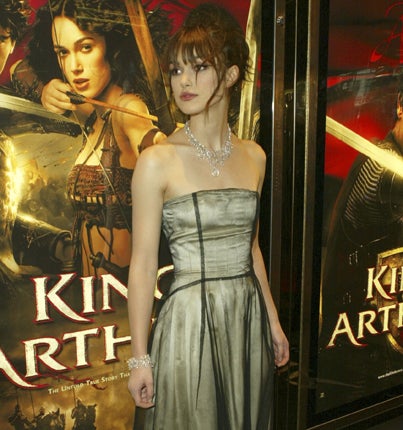Don't beef up Keira's bust! Lib Dems take aim at advertisers over altered images
MP calls for new controls to rein in advertisers who 'airbrush' for perfection

Kate Winslet's famous curves have been trimmed for a front cover and Keira Knightley's bust enlarged for a film poster. Madonna's biceps have been reduced for a magazine portrait, while veteran model Twiggy's wrinkles vanished in an advertisement for anti-ageing cream.
The technique of flattening tummies, shaping thighs, removing laughter lines and adding extra gloss to hair is now commonplace among photographers attempting to produce perfect images of the body beautiful.
But advertising chiefs are today urged to curb the practice of "airbrushing" – particularly in promotional material aimed at young girls. The Liberal Democrats warn that the use of altered images is adding to the pressure on vulnerable teenagers who already feel unhappy with the way they look.
The party is calling for a ban on the use of altered or enhanced pictures on publicity material aimed at the under-16s as part of a wider drive to boost the self-esteem of young girls. It also wants the introduction of new rules insisting that advertisements aimed at adults disclose how much images have been airbrushed or digitally enhanced.
Lib Dem frontbencher Jo Swinson said: "Today's unrealistic idea of what is beautiful means that young girls are under more pressure now than they were even five years ago. Airbrushing means that adverts contain completely unattainable perfect images no one can live up to in real life.
"We need to help protect children from these pressures and we need to make a start by banning airbrushing in adverts aimed at them."
Ms Swinson, who led a party review of women's policy, told The Independent: "The focus on women's appearance has really got out of hand. No one really has perfect skin, perfect hair and a perfect figure but women and young girls increasingly feel that nothing less than thin and perfect will do."
The issue of airbrushing first gained wide publicity in 2003 when a slimmed-down image of Kate Winslet appeared on the cover of GQ magazine – much to her chagrin. Its editor admitted the picture had been "digitally altered".
Keira Knightley's cleavage was noticeably bigger in advertisements for the film King Arthur in 2004, but four years later the star reportedly denied permission for her bust to be enhanced in posters for The Duchess.

Watch Apple TV+ free for 7 days
New subscribers only. £8.99/mo. after free trial. Plan auto-renews until cancelled

Watch Apple TV+ free for 7 days
New subscribers only. £8.99/mo. after free trial. Plan auto-renews until cancelled
Madonna's sinewy arms and biceps were sleek in images released in Vanity Fair last year. But Liz Hurley owned up to a "certain amount of retouching" as she launched a swimwear campaign, explaining: "We all like to get rid of spots and shadows under our eyes."
Only this week it emerged that the pregnant model Gisele Bündchen had had her "baby bump" digitally removed from publicity shots for a range of trench coats. And pictures of Twiggy taken during a trip to the supermarket suggested that photos for anti-ageing cream Olay had been heavily altered.
Two years ago, an inquiry into airbrushing by Baroness Kingsmill for the British Fashion Council warned that the practice could "perpetuate an unachievable aesthetic".
The Periodical Publishers Association, which represents 400 magazines, said: "Images are predominantly manipulated to remove... stray strands of hair, spots, bruises, creasing on clothes and shadows will be removed... articles and advertisements promoting a healthy lifestyle and should be seen as a partner in tackling eating and other disorders, rather than one of the sources."
A spokeswoman for the Advertising Standards Agency suggested it would be difficult to intervene to control airbrushing. She said: "All ads are altered or enhanced, whether it's food that has steam added at a later date to lighting techniques to airbrushing."
The Liberal Democrats are calling for youngsters to be given "media literacy" lessons to make them aware of the advertising techniques used by companies to sell clothes and cosmetics.
Subscribe to Independent Premium to bookmark this article
Want to bookmark your favourite articles and stories to read or reference later? Start your Independent Premium subscription today.

Join our commenting forum
Join thought-provoking conversations, follow other Independent readers and see their replies